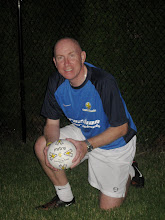(Ancaster News, July 8, 2010)
Not withstanding the country’s surprise exit from the 2010 World Cup, Ian McClurg is a firm believer in Brazilian soccer.
After all, McClurg knows the South American soccer giant takes its game very seriously. As the franchise owner of Brazilian Soccer Schools in Hamilton and Burlington, McClurg helps young players improve their individual skills the Brazilian way. By focusing on individual skills rather than stressing the need to win tournaments, McClurg believes young Canadian players can achieve greater success on the world field. He said a coaching approach focusing on individual skills could help Canada qualify for the world’s premier soccer tournament when it returns in 2014.
“In Canada, there is a sense of frustration as to why we aren’t there,” said McClurg. “The U. S. team should be a good benchmark for us. They’re a very fit, well organized team.”
McClurg, an Ancaster resident, said soccer powerhouses Italy, France and England may want to re-examine their technical training following their disappointing exits from the 2010 World Cup. Conversely, he credits the spread of Brazilian style training techniques for helping other South American teams like Uruguay and Paraguay, advance to the round of eight at the World Cup.
McClurg believes Canadian youth who dream of representing their country on the soccer pitch should be willing to train three times per week for a total of 12 hours. That includes one hour of stretching exercises per session and one hour of technical work.
Instead of focusing on game play and tournament victories, McClurg emphasizes individual skills, the fundamental principle behind the Brazilian Soccer Schools training method.
McClurg, who recently attained a UEFA Class A coaching license from the Irish Football Federation, said technical skills, not scores and standings, are the benchmark for success. He points out that many of Europe’s top soccer academies, like Liverpool FC, don’t even record team standings for players under 16. Youth teams, who focus only on gaining promotion or avoiding relegation to a lower league, may neglect their individual skills.
“It’s really lacking a training mentality,” McClurg said.
Brazilian Soccer Schools is a concept developed by British soccer enthusiast Simon Clifford. After visiting Brazil and watching children play a game called Futebol de Salao, Clifford noticed the young Brazilians had extraordinary ball handling skills. Their game, a variation of what most of the world calls football, is played with a smaller, size two ball. The Futebol de Salao ball is much weightier than a conventional ball. It has very little bounce. Instead of kicking the ball long distances and chasing it back and forth, Clifford noticed the Brazilian players used their superior ball handling skills to challenge the defenders.
Founded in 1996, Brazilian Soccer Schools uses the same method to improve individual skills. Clifford’s first school was launched in Leeds, England.
Today there are BSS schools across the U. K., offering cutting edge training techniques to a football crazed nation. Franchises have also appeared in 64 countries worldwide, including Canada.
In less than two years, McClurg has already helped some up-and-coming players advance to the next level, such as Adam Bouchard from Burlington, who at 14, was accepted for academy tryouts with Toronto FC’s program for 16-year-olds.
McClurg currently instructs over 100 students in Burlington and Ancaster. He dreams about someday making the BSS system as prevalent in Canada as the U. K. where programs exist in virtually every community.
For information on Brazilian Soccer School Canada visit www.icfds.com/burlington
Thursday, July 8, 2010
Subscribe to:
Comments (Atom)

